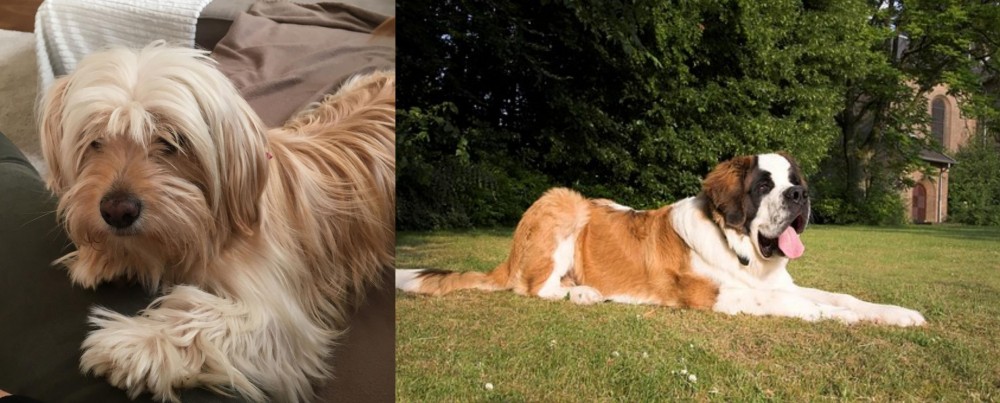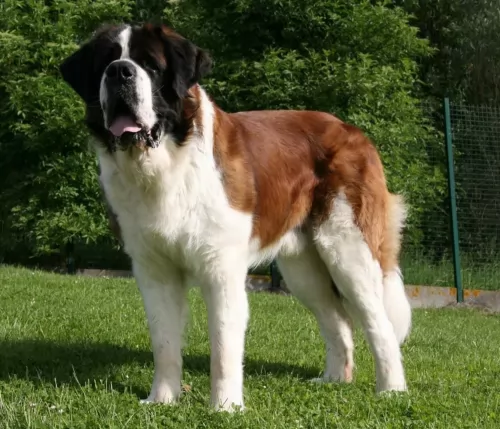 Petzlover
Petzlover Cyprus Poodle is originated from Cyprus but St. Bernard is originated from Switzerland. Cyprus Poodle may grow 41 cm / 16 inches shorter than St. Bernard. Cyprus Poodle may weigh 84 kg / 185 pounds lesser than St. Bernard. Cyprus Poodle may live 5 years more than St. Bernard. Cyprus Poodle may have less litter size than St. Bernard. Cyprus Poodle requires Moderate Maintenance. But St. Bernard requires High Maintenance
Cyprus Poodle is originated from Cyprus but St. Bernard is originated from Switzerland. Cyprus Poodle may grow 41 cm / 16 inches shorter than St. Bernard. Cyprus Poodle may weigh 84 kg / 185 pounds lesser than St. Bernard. Cyprus Poodle may live 5 years more than St. Bernard. Cyprus Poodle may have less litter size than St. Bernard. Cyprus Poodle requires Moderate Maintenance. But St. Bernard requires High Maintenance
 Unfortunately the Island of Cyprus may well be beautiful and have a wonderful climate, but when you take a deeper look, the island has a serious problem with feral cats and stray dogs.
Unfortunately the Island of Cyprus may well be beautiful and have a wonderful climate, but when you take a deeper look, the island has a serious problem with feral cats and stray dogs.
The many sanctuaries battle to keep up with the volume of neglected and abandoned animals on the island. One of the dogs found on the Island of Cyprus is the Cyprus Poodle. Some people say that the Cyprus Poodle is a cross between a poodle and a terrier.
Today this small dog is sought after in other countries for his loving personality and attractive looks.
 The St Bernard breed was once called the Alpine Cattle Dogs or the Alpine Mountain Dogs. They have always been farm dogs and mountain dogs in the French and Swiss Alps. They come from the border land of Switzerland and France. They were herding dogs, hunting, search and rescue, watchdogs and draft dogs.
The St Bernard breed was once called the Alpine Cattle Dogs or the Alpine Mountain Dogs. They have always been farm dogs and mountain dogs in the French and Swiss Alps. They come from the border land of Switzerland and France. They were herding dogs, hunting, search and rescue, watchdogs and draft dogs.
Their ancestors are considered to include the Sennenhunds and molosser breeds that came to the Alps with the ancient Romans. There are four Sennenhund breeds that are believed to have contributed to the original St. Bernard. These included the Greater Swiss Mountain Dog (Grosser Schweizer Sennenhund), the Appenzeller (Appenzeller Sennenhund), the Bernese Mountain Dog (Berner Sennenhund) and the Entlebucher Mountain Dog (Entlebucher Sennenhund) Today the St. Bernard is considered a Molossoid breed.
The first we know of the St. Bernard in any written records was in 1707 at the Great St. Bernard Pass and Great St. Bernard Hospice run by monks. There were found paintings of the dogs dating back into the late 1600’s. It is told that Barry saved upward of 100 people in the St. Bernard pass, and it is from these stories that the dogs gained their snow rescue reputation.
The St. Bernard of that time did not look like the St. Bernard does today as there was much crossbreeding. Many dogs dies during rescues in the avalanches of the mid 1800’s and so they Saint was crossed with the Newfoundland to preserve the breed. You can today see the resemblance in the build and looks of the two breeds. This cross brought about the long haired St. Bernard whose fur was too heavy for rescues.
The St. Bernards of mountain rescue fame were only about the size of a German Shepherd dog and were short haired. After crossing with the Newfoundland and moving into clubs and dogs shows, they have been bred to be much larger. Before the stud book was closed, it is thought that many larger breeds such as the Greater Swiss Mountain Dog, the English Mastiff, the Tibetan Mastiff, the Rottweiler, the Great Pyrenees, the English Bulldog, the Great Dane, the Bernese Mountain Dog, the Boxer and the Caucasian Oycharka all contributed to today’s St. Bernard.
In 1884 The Swiss St. Bernard Club was founded and the breed entered the Swiss Stud book as its first entry in 1884. It was 1888 when the standard was approved and the breed became the national dog of Switzerland. Before the name St. Bernard came to be common, these dogs might be called, Barry Dogs, Alepnmastiff, Noble Steeds or Saint Dogs.
The dogs came to England in the early 1800s and to the United States soon after. They were recognized by the European kennel clubs first and by the early 1900’s they were the most popular breed in the AKC.
 The Cyprus Poodle is such an attractive little dog with his jaunty personality and his dense, curly hair.
The Cyprus Poodle is such an attractive little dog with his jaunty personality and his dense, curly hair.
He stands in the region of 20 to 30cm and can weigh roughly 3 to 6kg. His hair is essentially cream or white with orangey tips and some people claim he is a cross between a poodle and a terrier.
He is a small dog. His curly coat is woolly and can be in a number of different colors such as white, ivory or apricot or even other colors.
The curly haired Cyprus Poodle isn’t a huge shedder but regular clipping keeps him looking nice and makes sure the coat doesn’t matt.
He has floppy ears, a long tail and brown eyes. He loves to go for a swim and then to dart around the place so he may require a bath every now and again to keep his beautiful coat clean and free of matting.
The Cyprus Poodle is an even tempered dog and he makes the perfect family pet, forming close bonds with his human family members.
He is playful, social and friendly and gets on well with children in the home as well as any other pets. He may be a small, friendly dog, but he will need training and socialization if you want him to be obedient and relaxed around other people.
 Today’s St. Bernard is not a large dog, he is a giant dog. Weighing in at 140-200 pounds and standing 28 to 35 inches tall, he is a lot of dog. Bred with mastiffs and large mountain dogs, they have proportional and powerful build. They are strong, sturdy and well muscled. They have either a smooth or rough (short or long) coat. Their eyes are brown or occasionally blue. They have tight lids, and square heads and muzzles.
Today’s St. Bernard is not a large dog, he is a giant dog. Weighing in at 140-200 pounds and standing 28 to 35 inches tall, he is a lot of dog. Bred with mastiffs and large mountain dogs, they have proportional and powerful build. They are strong, sturdy and well muscled. They have either a smooth or rough (short or long) coat. Their eyes are brown or occasionally blue. They have tight lids, and square heads and muzzles.
There are two coat types called smooth and rough, or short and long. The smooth shorter coat is tough, flat and close against the body and the long, rough coat is dense, wavy and heavy around the legs, neck and ruff. Both types have long tails that hang low and are heavy. Saints are known to slobber, drool and snore.
 Your Cyprus Poodle is just dying to be a member of a human family because he has a lot of love and friendliness to give.
Your Cyprus Poodle is just dying to be a member of a human family because he has a lot of love and friendliness to give.
He wants lots of love and attention in return though. He doesn’t like to be put out in the garden and forgotten about. Make sure that he is a fully involved family member.
He is such a friendly, loving, social little dog and in exchange for your love and care, he is guaranteed to make you a most wonderful and loyal friend.
 3.Adaptability no - these are giant dogs that need a lot of room. A large fenced yard or farm is best. They won’t do well in an apartment. They need exercise every day and loping around a yard is very good for them. They love to play in the snow, carry a backpack or pull a cart. They love to have a “job”
3.Adaptability no - these are giant dogs that need a lot of room. A large fenced yard or farm is best. They won’t do well in an apartment. They need exercise every day and loping around a yard is very good for them. They love to play in the snow, carry a backpack or pull a cart. They love to have a “job”
4.Learning ability – They are smart and highly trainable if motivated. They may appear lazy but they are just laid back and need a motivation.
 Because the Cyprus Poodle is a cross-breed, he is a robust, long-life dog and not likely to get ill very easily.
Because the Cyprus Poodle is a cross-breed, he is a robust, long-life dog and not likely to get ill very easily.
Your Cyprus Poodle can have between 1 to 6 puppies but there are tremendous health benefits waiting for your pet when you ensure that he is rather neutered or spayed in the case of a female. Make sure too that he has all his vaccinations up to date. Make sure he has an excellent diet, a warm, dry place to sleep, he is exercised and that he gets regular check-ups from the vet.
There are some common dog illnesses that you want to look out for. When he is a puppy make sure that he gets the necessary vaccination against life threatening illnesses such as parvovirus, distemper and rabies.
There are some diseases that do affect poodles a little more than with other breeds, and one of these is Cushing’s Disease.
This is an illness that comes about when the body of your dogs makes too much cortisol. It is difficult for you to see symptoms of this disease in your pet, but if he is displaying unusual behavior, then you want to get him to the vet who can decide on treatment for him.
 The first problem this breed faces is how fast they grow and gain weight. This can lead to serious health issues if not controlled. Their bones can be damaged by this excessively fast rate of growth. Other issues facing the breed include:
The first problem this breed faces is how fast they grow and gain weight. This can lead to serious health issues if not controlled. Their bones can be damaged by this excessively fast rate of growth. Other issues facing the breed include:
 A cyprus poodle makes such a good pet and you will want to ensure that you feed your one an excellent diet so that he remains healthy and content.
A cyprus poodle makes such a good pet and you will want to ensure that you feed your one an excellent diet so that he remains healthy and content.
Some people are overwhelmed at the sheer variety of commercially manufactured dog foods today, but the choice can be made a lot simpler by sticking to the better quality ones where protein is at the top of the ingredients list.
Home made food such as cooked brown rice, vegetables and cooked chicken will be excellent for your Cyprus Poodle as well as including some raw meat in the diet. Make sure he always has access to cool, clean water as this water is essential to his health, making it possible for all his bodily functions.
Brush his hair regularly and brush his teeth 2 or 3 times a week. Make sure to use toothpaste and toothbrush specially designed for dogs.
Your poodle will happily slot into life with you in the city or the country, but even if you have a garden, you can’t expect your dog to always find his own entertainment. Take your poodle for walks and play games with him so that he remains healthy and content.
 1.Feeding the puppy – You want to control their growth. Do not overfeed, and make sure they exercise but not too much. Feed a high quality large breed puppy food 3-4 X a day in small amounts.
1.Feeding the puppy – You want to control their growth. Do not overfeed, and make sure they exercise but not too much. Feed a high quality large breed puppy food 3-4 X a day in small amounts.
2.Feeding the adult – The problem you face with he adult St. Bernard is the potential for Bloat. Don’t over feed. Don’t feed before or after strenuous exercise. Feed 2-3 X a day in smaller amounts to prevent Bloat. Feed a high quality breed specific food if possible or an extra large breed formula.
4. Games and Exercises They need exercise but not as much as you might think. The St. Bernard is a laid back lumbering character so don’t over exercise her. They enjoy weight and cart pulling but they are not athletes who enjoy frisbee or agility. Search and rescue trials and tracking trials are perfect athletic endeavors for them.